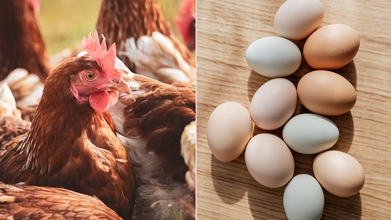- Health Conditions A-Z
- Health & Wellness
- Nutrition
- Fitness
- Health News
- Ayurveda
- Videos
- Medicine A-Z
- Parenting
Ayurveda Diet To Combat Stress And Restore Clarity

Ayurveda Diet To Combat Stress And Restore Clarity
Ayurveda, the ancient Indian system of medicine, emphasizes the interconnectedness of mind, body, and spirit. It offers holistic solutions for modern problems, including stress and mental imbalance, through personalized diet plans. These diets are tailored to balance and restore harmony within the body and mind.
Stress is viewed in Ayurveda as a disruption of mental and physical equilibrium, often caused by an imbalance in the doshas.
Vata dosha imbalance may lead to anxiety, restlessness, and insomnia.
Pitta dosha imbalance can manifest as irritability, anger, and frustration.
Kapha dosha imbalance might result in lethargy, depression, or a lack of motivation.
The key to reducing stress lies in rebalancing these doshas through mindful eating, proper food choices, and lifestyle adjustments.
1. Eat According to Your Dosha Type
Vata- dosha calming diet: Include warm, moist, and grounding foods like cooked grains, root vegetables, and healthy fats. Avoid raw, cold, or overly dry foods.
Pitta- dosha pacifying diet: Focus on cooling, hydrating foods like cucumbers, leafy greens, and coconut water. Minimize spicy, sour, and overly salty foods.
Kapha-dosha soothing diet: Opt for light, spicy, and warming foods such as lentils, ginger tea, and steamed vegetables. Avoid heavy, oily, or sugary foods.
2. Incorporate Stress-Reducing Foods
Ayurveda recommends foods that calm the nervous system and nourish the mind like Ashwagandha which is an adapt genic herb known for reducing cortisol levels and enhancing resilience to stress, Tulsi (Holy Basil) which gives a calming effect and supports mental clarity and reduces anxiety, Turmeric which is a potent anti-inflammatory that improves mood and brain health.
Intake of Almonds and Walnuts which are rich in omega-3 fatty acids, boost brain function and reduce stress.
3. Follow a Consistent Eating Routine
Eat meals at the same time each day to regulate the digestive system. Avoid overeating or skipping meals, as both can disrupt mental balance.
4. Use Spices for Mental Calmness
Spices like cardamom, cinnamon, fennel, and saffron enhance digestion, uplift mood, and calm the mind.
Stress-Reducing Ayurvedic Recipes
1. Golden Milk (Turmeric Milk)
Warm milk (dairy or plant-based) mixed with turmeric, black pepper, and a dash of honey promotes relaxation and better sleep.
2. Khichadi (Detoxifying Comfort Food)
A combination of rice, mung dal, and spices like cumin, coriander, and ginger helps stabilize doshas and provides a soothing effect on the mind.
3. Herbal Teas
Chamomile, Tulsi, or licorice teas reduce anxiety and promote mental clarity.
Lifestyle Enhancements for Better Results
Mindful Eating: Focus on the texture, flavor, and aroma of your meals to enhance digestion and reduce stress.
Yoga and Meditation: Regular practice enhances the effects of an Ayurvedic diet by calming the mind.
Adequate Sleep: Follow the Ayurvedic principle of sleeping early to allow the body and mind to rejuvenate.
Undergoing Kerala Ayurveda Treatments like Shirodhara, Pizhichil (hot oil bath), Head massage etc. will help to calm down the mind and helps in rejuvenation of body by expelling out all the toxins from the body.
An Ayurveda-based diet is more than just food; it is a way to align your inner rhythms with nature's cycles. By eating mindfully and according to your dosha type, you can reduce stress, restore mental balance, and lead a more harmonious life. Ayurveda reminds us that food is not just sustenance but also medicine for the mind and soul.
Start small by integrating Ayurvedic principles into your meals, and experience the profound transformation in your mental well-being.
How Much Water Should Your Child Be Drinking?

Credit:Canva
Been wondering if your child has been consuming too much or too little water each day?
According to Dr Keerti Kulkarni, a Telangana-based pediatrician, toddlers should be consuming about 100ml per kg of water every day, school children should drink up to 90ml per kg and teenagers should take in up to 60ml per kg.
In a lengthy Instagram post, she noted that about 20 percent of their daily required water intake comes from food includng fruits, vegetables, soups and parents should be mindful not to provide children with excess water.
Dr Kulkarani also said that there are exceptions for underweight children who have any other medical issues, such as kidney problems or if they are on any regular medication.
The expert warned: "Breastfed or formula-fed babies do not need extra water before solid foods and giving extra water to young infants can be dangerous and may cause low sodium levels."
What Are Signs Of Dehydration In Children?
Dehydration occurs when the body loses more fluids than it takes in, impairing normal function. In children, signs include:
- Dry or sticky mouth
- Few or no tears when crying
- Eyes that look sunken
- In babies, the soft spot (fontanelle) on top of the head looks sunken
- Darker pee, peeing less or fewer wet diapers than usual
- Crankiness
- Drowsiness or dizziness
- Rapid heartbeat
Why Is Drinking Excessive Water Dangerous?
Drinking excessive water can lead to water intoxication, causing symptoms like confusion, nausea, and seizures; severe cases may be fatal. Water intoxication, also termed hyperhydration, water poisoning or water toxaemia, develops when an individual drinks much more water than the kidneys can excrete.
The main function of the kidneys in the human body is the processing and excretion of excess water. However, the human kidneys can process only up to 0.8 to 1.0L of water at a time. Drinking an amount that exceeds this may overwhelm the kidneys and put the electrolyte balance out of sync in the human body.
Electrolytes, especially sodium, are essential in maintaining fluid balance within and outside cells. Hyponatremia is a condition in which sodium levels fall below 135 mmol/L, resulting from excessive water intake. This causes water to shift into cells, swelling them. In the brain, this can cause severe complications, including coma or even death.
Symptoms of water intoxication vary from mild to severe. Early symptoms are often similar to dehydration, which makes self-diagnosis challenging. Common symptoms include:
- Headaches
- Nausea and vomiting
- Muscle cramps or weakness
- Fatigue or drowsiness
- Confusion and disorientation
This Widely Used Supplement Can Reduce Anger, Study Shows

Credit: Canva
Eating omega-3-rich foods can reduce your aggression levels by 28 percent, an Aggression and Violent Behavior study suggests.
After analyzing 29 randomized controlled trials involving 3,918 participants in total, researchers from the University of Pennsylvania concluded that the fish oil supplement can reduce both reactive anger (in response to provocation) and proactive anger (behavior planned in advance) in people regardless of age, gender, medical diagnosis and length and dosage of treatment.
Neurocriminologist Dr Adrian Raine said of the results: "I think the time has come to implement omega-3 supplementation to reduce aggression, irrespective of whether the setting is the community, the clinic, or the criminal justice system.
"At the very least, parents seeking treatment for an aggressive child should know that in addition to any other treatment that their child receives, an extra portion or two of fish each week could also help."
The scientists theorized that omega-3 can reduce brain inflammation and regulate vital brain functioning which helps maintain aggression levels. However, they also noted that further research was needed to understand the link.
"Omega-3 is not a magic bullet that is going to completely solve the problem of violence in society. But can it help? Based on these findings, we firmly believe it can, and we should start to act on the new knowledge we have." Dr Raine said.
What Are Fish Oil Omega-3s?
Omega-3 fatty acids are polyunsaturated fats known for their crucial role in brain function and overall mental health. Fish oil is particularly rich in EPA and DHA, which are vital components of cell membranes and have strong anti-inflammatory effects in the body.These omega-3s play a critical role in human development, and they are primarily found in fatty fish and fish oil. Since many people do not consume enough fish, supplementation is often recommended to ensure adequate intake of these essential fatty acids.
Although the body can convert another type of omega-3, alpha-linolenic acid (ALA), into EPA and DHA, this process is not highly efficient. As a result, fish oil supplements may provide a convenient way to ensure optimal levels of omega-3s.
READ MORE: NHS Doctor Says This Oil Instead of Cod Liver Is The Best Omega-3 Source
Some popular sources of Omega-3 include:
- Salmon
- Cod Liver Oil
- Algae Oil
- Oysters
- Nuts and seeds, such as flaxseeds, chia seeds, and walnuts
- Plant oils, such as flaxseed oil, soybean oil, and canola oil
- Fortified foods, such as eggs, yogurt, juices, milk, etc.
How Omega-3s Improve Brain Health
EPA and DHA are essential for maintaining brain function throughout life. These fatty acids are abundant in the brain's cell membranes, helping to preserve cell health and facilitate communication between brain cells.
Research has shown that a lack of omega-3 can lead to cognitive impairments. In animal studies, diets deficient in omega-3s resulted in reduced DHA levels in the brain, leading to deficits in learning and memory. In older adults, lower DHA levels have been linked to a smaller brain size, which may indicate accelerated brain ageing.
Maintaining sufficient levels of omega-3s can help support cognitive function and may reduce the risk of age-related brain decline.
The optimal dosage varies, but research suggests that 1,000–2,000 mg of omega-3 fatty acids from fish oil daily is a good starting point. People with depression should look for supplements with higher EPA content. It is pertinent to note that people should consult health experts before starting fish oil supplementation.
Budget 2026: Cheaper Fish In India
Earlier this month, Finance Minister Nirmala Sitharaman announced a surprising tax reduction for India's fishers and marine industry, and experts say it is good news for you too.
Until now, fish caught by Indian vessels beyond territorial waters and brought back to the country for mass consumption has been treated as import, attracting customs duties and integrated goods and services tax (GST).
The combined tax burden raises costs and compliance issues, which discouraged people from deep-sea and exclusive economic zone (EEZ) fishing as well as
However, during her Union Budget 2026 presentation, Sitharaman proposed that fish caught in the EEZ and high seas by Indian fishing vessels are treated as duty-free when brought into Indian ports and treated as exports when landed at foreign ports.
This means that the market availability for Omega-3 packed fishes including salmon, mackerel, tuna, herring and sardines will significantly increase as their existing steep prices see a tremendous fall.
Bird Flu In India: How Safe Is It To Eat Chicken And Eggs?

Credits: Canva
Bird Flu In India: Amid bird flu fears from Bihar's Bhagalpur district in Naugacha, where over 150 crows were found dead, new concerns are being raised around poultry products. Chennai too is facing a high bird flu alert, there too, dead crows were found. This is why it is important to know how to consume poultry safely and what all to keep in mind while handling poultry.
While there is no confirmation yet in if it has spread in chicken, India has seen previous cases of avian flu in chicken. Here's what you should know about consuming poultry.
Bird Flu In India: How To Consume Poultry Safely?
Pasteurization and cooking them at high temperatures can curb the threat. It is also important to handle your poultry products when you are buying and storing them.
Also, avoid drinking raw milk to kill avian influenza A(H5N1).
Bird Flu In India: How To Handle Chicken While Shopping?
The meat juice can spill over and contaminate other food items, therefore it is extremely important to store it properly, in a way that it does not contaminate another food item. Always store it in a cool bag when you are transporting it and refrigerate and freeze the meat for the first two hours of buying.
You must also cook your chicken so the viruses do not survive on the chicken.
Read: How To Eat Eggs Safely?
Bird Flu In India: Is It Safe To Eat Chicken?
Yes, chicken and eggs are still safe to consume, as long as they are thoroughly cooked. Cooking chicken to the internal temperature of at least 165°F kills bacteria, viruses, and other germs, such as H5N1. The most accurate method of assuring that food is cooked is to use a meat thermometer.
Safe food handling is crucial:
- Maintain a hygienic kitchen by disinfecting countertops and washing hands both before and after touching raw meat.
- Prevent cross-contamination by employing distinct cutting boards and utensils for raw and cooked food.
Bird Flu In India: How to Handle Eggs And Consume It Safely?
Flu viruses can infect chicken eggs by entering through the eggshell. The eggshells are smaller than the pores of eggshells, which means viruses can enter the eggs and the egg's surface will still be protected. However, it is still important to handle it safely.
As per the US Food and Drug Administration, cooking poultry, eggs and other animal products to the proper temperature and preventing cross-contamination between raw and cooked food.
Reject suspect eggs that are small, soft-shelled, or deformed since these may be a sign of infection in hens, though infected birds usually discontinue laying eggs before the situation gets worse.
What Should You Avoid?
- Raw or undercooked chicken
- Raw or soft eggs
- Raw milk and unpasteurized dairy products
- Cross-contaminated foods
- Meat from unregulated sources
Safest Way to Cook Eggs
While pasteurized eggs have a lower risk of infection because pasteurization effectively kills viruses, including bird flu, and bacteria. When cooking eggs, FDA officials advise:
- Washing hands, utensils,, and work surfaces with hot, soapy water before and after touching raw eggs.
- Cooking eggs until both the yolk and white are firm.
- Making sure scrambled eggs are fluffy and not runny.
- Cooking casseroles and other dishes with eggs to 160 degrees Fahrenheit.
- Serving cooked eggs right away. Don't leave egg dishes out for more than 2 hours.
- Using an insulated cooler to transport eggs and egg products for picnics or gatherings.
- Reheating any leftover egg products from the fridge to 165 degrees Fahrenheit.
© 2024 Bennett, Coleman & Company Limited

